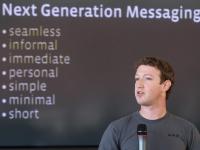BOB GARFIELD: It’s the clash of the Internet titans, the battle royale of Web behemoths, the showdown in – whatever. It’s Facebook versus Google.
MALE CORRESPONDENT: Facebook thinks it might have revolutionized messaging.
MALE CORRESPONDENT: The social networking site unveiling a one-stop shop for instant messages, text messages, Facebook messages and emails.
FEMALE CORRESPONDENT: The people at Facebook have named it the “Gmail Killer.”
BOB GARFIELD: This week, Facebook announced Facebook Messages. Business Week called it, quote: “nothing less than a revolutionary bid to make Facebook our personal communications hub.” Dan Gillmor, of the Knight Center for Digital Media Entrepreneurship, on the other hand, said the prospect of Facebook capturing his identity online was, quote: “not just disturbing, but dangerous.” Dan, welcome back to the show.
DAN GILLMOR: Thanks for having me.
BOB GARFIELD: Let's start with what this is, Facebook Messages – email, instant messaging, mobile texts, I guess Facebook wall posts, all streaming onto your page. Can you describe what it looks like to the user?
DAN GILLMOR: If you set it up the way they are suggesting, you have three central buckets for information. One is the people you know on Facebook and the people they know, friends and friends of friends. Then there is a category of “other.” For example, my bank is not my friend, and if a message from my bank came in, it would go into the “other” bucket. And then there’s a third one called “spam,” which is exactly what it sounds like. I've only just started to play with it. They're rolling this out very slowly, and I've been given one of the early accounts to try it. And it’s quite interesting, but, as you noted, I'm skeptical in many ways.
BOB GARFIELD: Tell me what frightens you about this.
DAN GILLMOR: Kind of a longstanding issue that I and many others have had with Facebook is, I think, their casual approach to privacy, despite their pronouncements. In this case, they're going to archive everything that you do. You’re going to have to go and delete stuff.
BOB GARFIELD: You mean all of my emails, messages from other platforms, rational and irrational, tasteful and distasteful, safe for work and unsafe at any speed, all of it stays on Mark Zuckerberg’s servers in perpetuity?
DAN GILLMOR: My understanding is if you have decided to import everything into your Facebook Messaging that all of these conversations that you have will be saved for posterity, police and divorce lawyers. I think a default should be that you archive it if you want to and not that it’s something you have to un-archive. And keep in mind, everything we say is, for Facebook, data that is useful, in part, for selling advertising.
BOB GARFIELD: But apart from privacy, you have other concerns, as well.
DAN GILLMOR: And that is that Facebook has a very strong interest in having you spend as much time inside of Facebook as your primary place of doing stuff when you’re online. I want people to experience a broad and increasingly diverse and interesting Internet and not to get pulled into the walled gardens that others are creating.
BOB GARFIELD: I myself use Gmail and I have a Google home page with all of my news feeds set up and so forth and so on, and it’s an enormous nuisance to change platforms. If I'm to embrace Facebook Messages, do I have to move my life from Google to Facebook or can I simply send my Gmail into the Facebook stream?
DAN GILLMOR: As far as I know, you can forward anything you want into the Facebook stream. It’s fascinating, because a lot of people use Gmail to do exactly that with their other email. But I have to say I've done neither of those two and plan to do neither of those two. I think you need your own home base on the Internet that is controlled by you, to the extent that such things are controllable, and not by some large enterprise that can make decisions down the road that you might not agree with and then leave you scrambling to do something different.
BOB GARFIELD: So you have Dangillmor.com?
DAN GILLMOR: I do.
BOB GARFIELD: And what do you sacrifice by being the master of your own domain?
DAN GILLMOR: Well, I sacrifice a little bit of money because I have to pay for it. I sacrifice some of the truly wonderful manipulating of email tools - using manipulating in the best way - that you can get with some of the providers that are all up in the cloud online, like Gmail. But I have my own online presence that is my frame of reference about myself. And one of the things that we don't remember often enough is that people who are not particularly savvy about technology but just want to use things, they tend to accept whatever service is there based on what the provider has put in their face. So Facebook’s decisions are going to have huge influence on how a lot of people communicate. And I'm in absolute awe of the technical brilliance of that company, and the vision as well, but I do stay quite concerned about where they're leading us.
BOB GARFIELD: Well, maybe I'll split the difference. Maybe I'll leave Gmail, not go to Facebook Messages, but what I want is for my email address to be Bob@dangillmor.com.
DAN GILLMOR: [LAUGHS] I'll set it up later.
[LAUGHTER] However, I make no representations for privacy.
BOB GARFIELD: [LAUGHS] Dan, thank you very much.
DAN GILLMOR: You’re welcome.
BOB GARFIELD: Dan Gillmor is director of the Knight Center for Digital Media Entrepreneurship.
[MUSIC UP AND UNDER]

